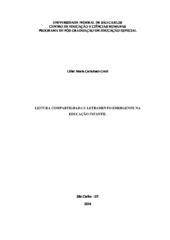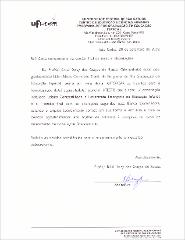| dc.contributor.author | Conti, Lilian Maria Carminato | |
| dc.date.accessioned | 2019-10-14T12:47:02Z | |
| dc.date.available | 2019-10-14T12:47:02Z | |
| dc.date.issued | 2018-10-19 | |
| dc.identifier.citation | CONTI, Lilian Maria Carminato. Leitura compartilhada e letramento emergente na educação infantil. 2018. Tese (Doutorado em Educação Especial) – Universidade Federal de São Carlos, São Carlos, 2018. Disponível em: https://repositorio.ufscar.br/handle/ufscar/11929. | * |
| dc.identifier.uri | https://repositorio.ufscar.br/handle/ufscar/11929 | |
| dc.description.abstract | Providing significant learning experiences in reading and writing in order to guarantee that all the students have the same opportunities constitutes one of the greatest challenges of Brazilian Education. The constant contact with children’s storybooks and the adequate preschool teacher intervention during the reading process seem to act favorably toward the development of the Emergent Literacy. Aiming to investigate the Emergent Literacy, this research is divided into two studies developed with preschoolers. The studies were conducted in a Municipal Preschool Education Center, in a medium-sized city of São Paulo state countryside. In the first study, the goal was to identify whether there is a relation between the students’ repertory (related to the abilities of the Emergent Literacy) and the teacher’s perception regarding these repertories. Four teachers and their students – who pertained to the age bracket of the last phase of the Preschool Education program – participated in this study. Each teacher indicated six students, three with low and three with high performances in activities related to reading and writing, totaling 24 participating students. After indication, the teachers answered a questionnaire about each different student, who was also evaluated by the researcher through the Emergent Literacy Scale. In most cases, the teachers’ assessments tended to correspond to the scores from the Scale for the high-performing students, but they were more discrepant from this measurement for the low-performing students. The teachers tended to evaluate these last students with scores worse than the ones from the scale, except in four (from twelve) cases. The second study aimed at replicating a reading and writing teaching program with a shared-reading approach. Three groups of students in the age bracket of the last phase of the Preschool Education program participated, totaling 55 students. Two groups worked with the mentioned teaching program, while the third served as control. The program was developed in the format of shared-reading workshops, performed inside the classrooms and planned together with each teacher. All the workshops followed a guideline in order to guarantee the stimulus to every component of the Emergent Literacy, by means of different activities: 1. familiarization with the books; 2. shared-reading; 3. make-believe story reading and students handling of books. The application of the teaching procedures was conducted in 15 sessions, each lasting from 20 to 30 minutes, three times a week, for two months. The students were evaluated through the Emergent Literacy Scale (pretest and posttest). The results show that the workshops reduced the variability among the participants, making their performance more similar (around the average) in terms of the repertory of the participant groups when compared with the control group. However, even though some students reached maximum or close to the maximum scores, the averages suggest that the groups, as a whole, did not achieve the maximum potential assessed by the Scale. Some adjustments are recommended for the next replications. Implications to the educational practice and to the formation of preschool teachers are discussed, based on the results of both conducted studies. | eng |
| dc.description.sponsorship | Não recebi financiamento | por |
| dc.language.iso | por | por |
| dc.publisher | Universidade Federal de São Carlos | por |
| dc.rights | Attribution-NoDerivs 3.0 Brazil | * |
| dc.rights.uri | http://creativecommons.org/licenses/by-nd/3.0/br/ | * |
| dc.subject | Educação especial | por |
| dc.subject | Letramento emergente | por |
| dc.subject | Leitura compartilhada | por |
| dc.subject | Baixo desempenho | por |
| dc.subject | Pré-escolares | por |
| dc.subject | Special education | eng |
| dc.subject | Emergent literacy | eng |
| dc.subject | Shared-reading | eng |
| dc.subject | Low performance | eng |
| dc.subject | Preschoolers | eng |
| dc.title | Leitura compartilhada e letramento emergente na educação infantil | por |
| dc.title.alternative | Shared-reading and emergent literacy in preschool education | eng |
| dc.type | Tese | por |
| dc.contributor.advisor1 | Souza, Deisy das Graças de | |
| dc.contributor.advisor1Lattes | http://lattes.cnpq.br/4404800720856419 | por |
| dc.description.resumo | Proporcionar experiências significativas de aprendizagem em leitura e escrita de forma a garantir que todos os alunos tenham as mesmas oportunidades, constitui-se um dos grandes desafios da educação brasileira. O contato constante com livros de histórias infantis e a intervenção adequada do professor de educação infantil no momento da leitura parecem atuar de forma favorecedora para o desenvolvimento do letramento emergente. Com o objetivo de identificar, estimular e avaliar as habilidades de letramento emergente, esta pesquisa está organizada em dois estudos desenvolvidos com alunos da educação infantil. Os Estudos foram realizados em um Centro Municipal de Educação Infantil, em uma cidade de médio porte do interior do Estado de São Paulo. No primeiro Estudo, o objetivo foi identificar se existe relação entre o repertório dos alunos (relacionados às habilidades de letramento emergente) e a percepção do professor quanto a estes repertórios. Participaram do estudo quatro professores e seus respectivos alunos, na faixa etária da última fase da Educação Infantil. Cada professor indicou seis alunos, três com baixo desempenho e três com bom desempenho em atividades relacionadas a leitura e escrita, totalizando 24 alunos participantes. Após indicação, os professores responderam a questionários referentes a cada um dos alunos, os quais também foram avaliados pela pesquisadora por meio da Escala de Letramento Emergente. Na maioria dos casos, as avaliações dos professores tenderam a corresponder aos escores da Escala para os alunos com bom desempenho, mas foram mais discrepantes dessa medida para os alunos com baixo desempenho. Os professores tenderam a avaliar estes últimos com um conceito pior que o escore na escala, exceto em quatro (dos 12) casos. O Estudo 2 buscou replicar um programa de ensino de leitura a partir da abordagem da leitura compartilhada. Participaram três turmas da última fase da Educação Infantil, totalizando 55 alunos. Duas turmas trabalharam com o programa de ensino, enquanto a terceira turma serviu como controle. O programa foi desenvolvido no formato de Oficinas de Leitura Compartilhada, realizadas em sala de aula, planejadas em conjunto com cada professora. Todas as oficinas seguiram um roteiro para garantir o estímulo a todos os componentes do Letramento Emergente, por meio de diferentes atividades: 1. familiarização com os livros; 2. leitura compartilhada; 3. leitura de faz-de-conta; 4. manuseio dos livros por parte dos alunos e, 5. atividades relacionadas às leituras realizadas. A aplicação dos procedimentos de ensino foi conduzida em 15 sessões, três vezes por semana, com duração de vinte a trinta minutos cada, ao longo de dois meses. Os alunos foram avaliados por meio da Escala de Letramento Emergente (pré-teste e pós-teste). Os resultados mostram que a realização das oficinas reduziu a variabilidade entre os participantes, tornando seus desempenhos mais similares (em torno da média) no repertório das turmas participantes em comparação à turma controle. Porém, embora alguns alunos tenham alcançado escores máximos ou próximos do máximo, as médias sugerem que as turmas, como um todo, não alcançaram o potencial máximo avaliado pela Escala. Alguns ajustes são indicados para as próximas replicações. Implicações para a prática educativa e para a formação de professores de educação infantil são discutidas, a partir dos resultados de ambos os Estudos. | por |
| dc.publisher.initials | UFSCar | por |
| dc.publisher.program | Programa de Pós-Graduação em Educação Especial - PPGEEs | por |
| dc.subject.cnpq | CIENCIAS HUMANAS::EDUCACAO::TOPICOS ESPECIFICOS DE EDUCACAO | por |
| dc.publisher.address | Câmpus São Carlos | por |
| dc.contributor.authorlattes | http://lattes.cnpq.br/4306989351358925 | por |


